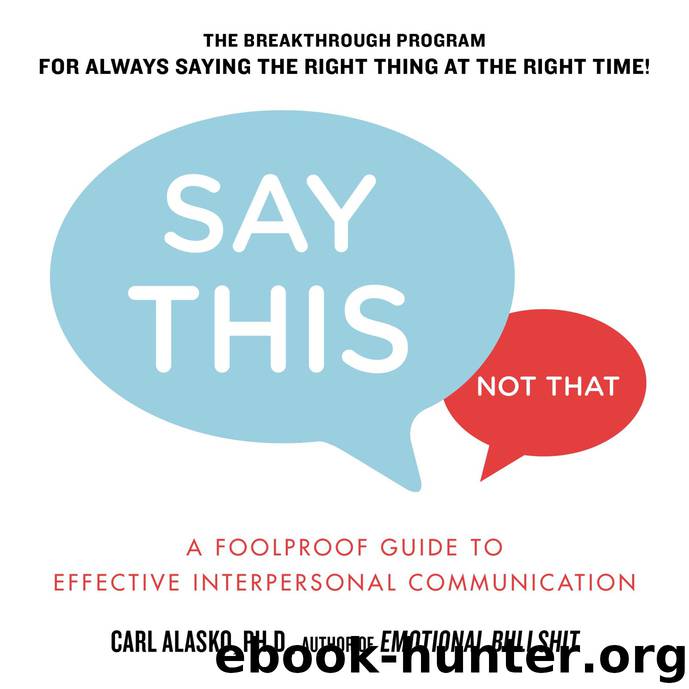Say This, Not That by Carl Alasko Ph. D

Author:Carl Alasko Ph. D.
Language: eng
Format: epub
Publisher: Penguin Group US
Published: 2014-01-16T05:00:00+00:00
I’m Not Upset—Yes, You Are!
THE SITUATION: You and Shelby have a flare-up over breakfast, and when you come home, she’s sitting alone, looking glum.
DON’T SAY THIS: “I don’t understand why you’re still upset about this morning.” (Sending the wrong message: I know what’s wrong with you.)
NEVER ASSUME: A cardinal rule of relationships: Do not insist that you know why your partner is behaving in a particular way.
WHAT’S WRONG WITH IT: This approach is fundamentally disrespectful because it’s an attempt at emotional domination. You’re not only suggesting that she’s feeling an inappropriate emotion (about the earlier argument) but that her feeling is somehow wrong. You’re forcing her to defend both herself and her emotions. All of these behaviors add up to controlling your partner’s freedom to feel, think and behave. While it may seem clear to you that your partner is upset and (more important) why, she could also be tired, hungry, worried about work or distressed for any number of reasons. Starting any conversation this way will create resentment.
MASTER TIP: Don’t play the all-knowing psychic in your relationships. While it’s okay to suggest you might know something, be careful about making it sound like you know. Even when you think you’re sure you know what’s going on with your partner, leave plenty of room to back off if your guess is wrong.
SAY THIS: “You seem a little glum. Feel like talking for a few minutes?” or “Is there anything you might want to talk about?” (Sending the right message: I’m sensitive to your feelings and available to give support.)
ABSORB YOUR ANXIETY: When you see your partner looking dejected, it’s entirely natural to feel anxiety. People don’t like to see someone they love in pain. But acting on your anxiety by blurting out an accusation—even a soft one—can trigger a Reactive Response. And we already know that an RR puts you both in danger.
STAY SUPPORTIVE: Offering a supportive or at least neutral comment is the best way to keep any discussion, in any situation, moving forward. Showing interest in your partner’s life and feelings, and avoiding the assumption that you already know all about them, plays an enormous role in promoting closeness and happiness.
REAL-LIFE STORY: Yolanda had just started a new job and was having a tough time. But every time she’d start to speak about it, her partner, Ken, would interrupt with an assumption. “Let me guess: Someone spoke to you rudely again and you’re resentful.” Only when she told him firmly that she needed him to listen, not assume that he knew what she was feeling, and not say anything until she was finished, did he finally sit quietly while she spoke. He finally got that supporting her meant simply . . . listening.
Download
This site does not store any files on its server. We only index and link to content provided by other sites. Please contact the content providers to delete copyright contents if any and email us, we'll remove relevant links or contents immediately.
Should I Stay or Should I Go? by Ramani Durvasula(7642)
The Lost Art of Listening by Michael P. Nichols(7485)
The Rosie Project by Graeme Simsion(6364)
Beartown by Fredrik Backman(5726)
We Need to Talk by Celeste Headlee(5604)
Ego Is the Enemy by Ryan Holiday(5406)
Hunger by Roxane Gay(4920)
Suicide Notes by Michael Thomas Ford(4812)
I Love You But I Don't Trust You by Mira Kirshenbaum(3858)
Mummy Knew by Lisa James(3678)
Not a Diet Book by James Smith(3405)
Crazy Is My Superpower by A.J. Mendez Brooks(3386)
Toxic Parents by Susan Forward(3276)
Girl, Wash Your Face by Rachel Hollis(3273)
The Complete Idiot's Guide to Coping With Difficult People by Arlene Uhl(3138)
The Social Psychology of Inequality by Unknown(3013)
Name Book, The: Over 10,000 Names--Their Meanings, Origins, and Spiritual Significance by Astoria Dorothy(2967)
The Hard Questions by Susan Piver(2967)
The Gaslight Effect by Dr. Robin Stern(2790)
